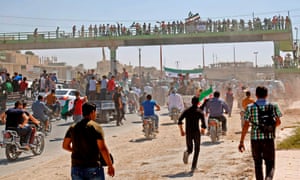All have a stake in the most complex, feared – and possibly last – battle of the most consequential war of modern times, a conflict that has routinely crushed Syria’s old and frail in a never-ending rush to bury its young, while at the same time fuelling potent geopolitics that have shaken the country’s foundations and may end up reshaping its borders.
Idlib, a holdout as war consumed nearby Aleppo, Hama and Homs, as well as the capital Damascus, has steadily become a microcosm of the war – a place where every player in the conflict, from inside the country and out, has taken a stake.
As opposition strongholds elsewhere in the country crumbled, those who refused so-called reconciliation deals with the regime were steadily corralled into the small mountainous patch of the northwest, where they were blended in with extremists who have been influential in the area for much of the past six years.
Facebook Twitter Pinterest
Syrian girls at a camp for displaced people in Idlib province. Photograph: Aaref Watad/AFP/Getty Images
Idlib is the one province of the country where terrorist groups have often held sway – helping fulfil the Assad narrative that all those who stood against him were terrorists. The al-Qaida aligned Jabhat al-Nusra – now known as HTS, remains strong, and its presence is being used as a pretext by Russia to attack.
Turkey, which has supported anti-Assad forces throughout the war – with varying levels of enthusiasm – has been tasked by Moscow with forcing HTS’s withdrawal. The jihadist group has refused, and attempts by opposition groups to force its exit have also failed.
So too have efforts to negotiate a safe passage for what will inevitably be another exodus of internal refugees. Having fled from all corners of the country, often to escape the Syrian state, few of the displaced say they will risk seeking shelter among officials whom they fear will persecute them.
“Jabhat al-Nusra is a shadow of the power it used to be,” said Abu Ruma, 34, an Idlib native. “Especially since other fighting battalions have joined under one force now. We are not expecting them to put up a fight. They’re residing in the north now with lots of refugees and families.”
Dounia Shehabi, 29, whose family fled eastern Aleppo when it fell to Iranian-backed forces in early 2017, said extremist groups had blended in with locals and the internally displaced, with many having abandoned their weapons. “They’re not our main concern. They are small in number and out of options. What we are worried about far more is where do we go when the Russians start their blitz.”
Labib al-Nahhas, who has been active in opposition political circles for the past five years, said the suggestion by Stefan de Mistura, the UN special envoy, to open humanitarian corridors into regime-held areas had “potentially devastating consequences”. Nahhas also condemned the UN claim that as many as 10,000 jihadists remained in Idlib.
“These claims are factually wrong and contextually misleading,” he said. “They feed into the Russian propaganda that is trying to falsely justify a full scale attack on Idlib with catastrophic results.
“It’s totally ludicrous to attempt to address the situation in Idlib through ‘humanitarian corridors’ towards regime areas – especially for civilians who fled from the regime’s controlled areas and preferred to live in refugee camps.
“Pushing civilians who fled from the regime’s oppression and persecution into Assad’s hands means they will suffer the same fate of hundreds of thousands other Syrians: either murdered, or imprisoned.”
Facebook Twitter Pinterest
A man waves a flag of the opposition as he protests against the Assad regime and Russia in the rebel-held town of Maaret al-Numan in the north of Idlib province. Photograph: Zein Al Rifai/AFP/Getty Images
Ahead of a strike, expected by regional officials within two weeks, the potential scale of the humanitarian crisis is causing widespread alarm. The bombardment of a tightly packed population, many of whom live under primitive shelter, with irregular supplies, will inevitably force an exodus towards Turkey’s tightly sealed border, or a swathe of northern Syria that has been under its control for 18 months.
Turkey has not yet decided whether it will allow refugees into the area, known as the Euphrates Shield Zone. It has been pushing Russia to hold off on launching an attack. Turkish officials said on Friday that they had little leverage over Moscow and feared a strike could be launched by a Russian naval group as early as next week.
“The Turkish areas Afrin and the Euphrates Shield areas do not have the infrastructure necessary to receive hundreds of thousands of new people,” said a senior aid worker in Turkey. “Sending people there will only move the catastrophe from one area to the other. Here’s a solution; don’t force them to leave. Be discerning with the bombardment. The world should hold the Russians and the regime to account.”
“The regime and the Russians might attack any day at any moment,” said a 27-year-old Idlib activist, who refused to be named. “We barely have a few forts to keep it together here. There are not many preparations. The Turks have been assuring people that there will not be fight, no battle.”
Facebook Twitter Pinterest
Smoke rises after a bomb hit a rebel position during heavy fighting between troops loyal to president Assad and opposition fighters in 2013, in a neighbouring village to Kafr Nabuda, in Idlib province. Photograph: AP
Among the ranks of the Turkish-backed opposition, which was raised to fight the Syrian army, but co-opted earlier this year to capture the border town of Afrin from Kurdish forces, there is a belief that regime forces do not have the numbers to launch a ground attack, and Iranian militias do not have the incentive.
“The Iranians have already got what they wanted elsewhere in the country,” said Mohaned al-Rifai, an opposition member. “There are plenty of people up here who want to fight and know how to. They have incentive. They have lost everything elsewhere in the country. Many are from Ghouta, or Aleppo. There is a score to settle, and we know how the Russians work. There will be no running like there was in Aleppo.”
Munef al-Shami, an opposition leader, agreed. “The Turks will help us if we are in a corner. They don’t want to annoy the Russians, but they don’t want to lose their influence either. We are at the mercy of powers that are much bigger than us. This is a game that we cannot influence. It’s much bigger than the blood of the people and the soil it bleeds into.
“Idlib is where agendas all come together. There will be cruelty and massacres here. And on a global stage, there will be big losses.”
source:-theguardian




